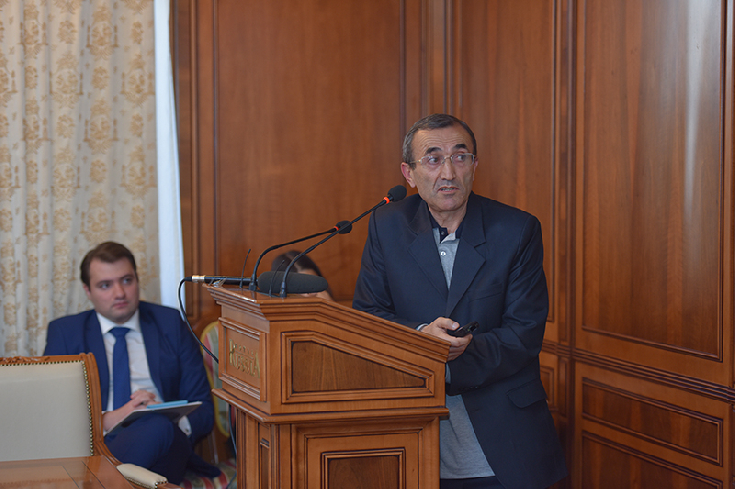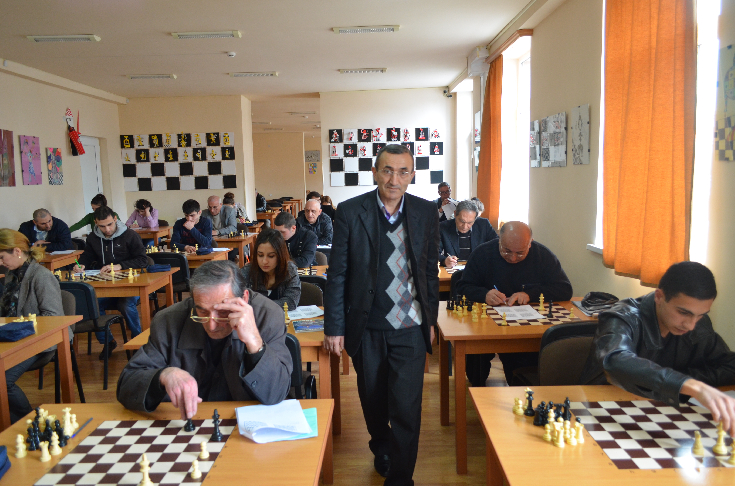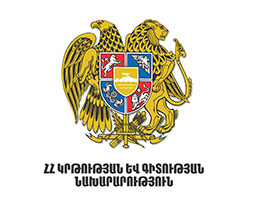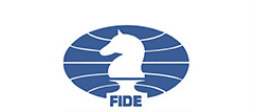
 ChessAcademy.am
ChessAcademy.am
Main Directions that Have Been Implemented to Establish the “Chess in Schools” Program According to an Experienced Lecturer-Methodologist
 The interview with Samvel Misakyan, ASPU lecturer, mathematician and methodologist, will gives us a detailed insight into the characteristics about the preparation, implementation and current endeavors of “Chess in schools”. To this end, we will discuss the topic of chess as a school subject and and the existing challenges in general. Firstly, Mr. Misakyan mentioned that before the CIS program implementation, he was teaching mathematics in a secondary school while teaching chess to all those gifted schoolchildren who had been pre-selected beforehand and wanted to deepen their knowledge in chess. Later Mr. Misakyan was invited to take part in those discussions that were being organized in the Chess academy of Armenia where psychologists and chess trainers as well as different representatives from the education field were taking part. Mr. Misakyan noted that though the enthusiasm for the idea was great, there was also fear of overcoming possible difficulties of implementing the idea, especially considering the fact that, for example, the investment of chess as a school subject in the Soviet Union did not have the desired effect and the initiators failed to organize teaching of chess in public schools as a compulsory subject. In this regard, it was clear from the start that a lot of hard work had to be done for the consistent implementation of the idea that would help to avoid possible failure and would guarantee the desired result of the program.
The interview with Samvel Misakyan, ASPU lecturer, mathematician and methodologist, will gives us a detailed insight into the characteristics about the preparation, implementation and current endeavors of “Chess in schools”. To this end, we will discuss the topic of chess as a school subject and and the existing challenges in general. Firstly, Mr. Misakyan mentioned that before the CIS program implementation, he was teaching mathematics in a secondary school while teaching chess to all those gifted schoolchildren who had been pre-selected beforehand and wanted to deepen their knowledge in chess. Later Mr. Misakyan was invited to take part in those discussions that were being organized in the Chess academy of Armenia where psychologists and chess trainers as well as different representatives from the education field were taking part. Mr. Misakyan noted that though the enthusiasm for the idea was great, there was also fear of overcoming possible difficulties of implementing the idea, especially considering the fact that, for example, the investment of chess as a school subject in the Soviet Union did not have the desired effect and the initiators failed to organize teaching of chess in public schools as a compulsory subject. In this regard, it was clear from the start that a lot of hard work had to be done for the consistent implementation of the idea that would help to avoid possible failure and would guarantee the desired result of the program.
Thus, since 2010, on the basis of respective government decision to include chess in the second to fourth grade curriculum in junior secondary school, the panel of experts began a regular series of meetings under the leadership of the president of Chess Academy of Armenia, Smbat Lputian. Firstly, the working group of experts was formed to discuss the future chess textbook with Hamlet Toomanyan, who was present during the meeting discussions and was representing examples of chess classes to the experts, taking into account the comments and opinions voiced by them.
Mr. Misakyan stressed in the conversation with us that the author of the textbook provided progressive approach and the principles according to which the textbooks were created were innovative in comparison with older chess books. Later, in early 2011 their long-term cooperation with the group of experts who were involved in the book creation process also started the working groups of psychologists and chess players who were eager to turn the "Chess in Schools" into reality. Hence, they were having meetings on the daily basis. In the first year, Mr. Misakyan was included in the group of chess players, then also took part in the working group that was responsible for the chess textbooks’ creation. In the first year of implementation, groups were busy with working out the teachings that later would find their place in the textbooks. Immense work had also to been done for the preparation of workbooks and teachers' manuals. The latter had leading role for training of teachers and now, when we look back trying to evaluate the quality of them we can state with confidence that they are in an encyclopedic form and provide all chess teaching professionals with plenty of knowledge. The group of psychologists, which was headed by PhD, Candidate of Psychological Sciences, professor Ruben Aghuzumtsyan, was working together with Mr. Misakyan’s team and their task was to to prepare the training program for chess teachers.
It should be noted that the first precondition for the future success was to find qualified professionals, that was carried out according to the following principle: parallelly to the activities of the working groups the international GM Smbat Lputian was holding simultaneous games in all regions of Armenia, visiting the large and small towns and rural communities. The sessions were conducted by Mr. Lputian and, as a result, people were being chosen who had enough knowledge and hence the opportunity to get trained as chess teachers and teach chess in secondary schools of Armenia. The search for future teachers demanded a long time, and in some cases it was necessary to organize Mr. Lputian’s visits to the regions second or even third time. Due to the process of raising professionals, future teachers were found some of whom were players, but had no experience in teaching, and the other half had a college education and experience and some knowledge of chess as well and could also be trained as chess teachers.
Thus, the recruitment of future teachers was organized at a high level, resulting in the formation of groups of experts in the regions. Firstly in Yerevan and then in all regions, a clear timetable for implementation of teacher training was formed. Working groups of chess trainers and psychologists were divided into 6 separate groups, each of which included a professional chess trainer and a psychologist. The trainings were very successful, and we think it is important to note that during the first year of training, professionals deeply devoted to chess were mainly recruited, which is evident from the fact that the number of people who failed the exam was negligible. The program of trainings had clear rules and according to pre-established plan, time was allocated to the teaching of chess as well as to the study of the basic principles of pedagogical psychology. The trainings were conducted through previously developed teaching materials and were followed by qualification examinations. After the training process the participants had exams and the ones who passed the threshold of 10 out of 20 gained the right to teach chess in the elementary school. The same principle of trainings and the qualification exams were held in all regions, and based on the fact that there was a problem with the number of qualified professionals in the provinces the exam barrier was reduced by one point to nine.
After a successful completion of the the 2011-2012 academic year in the Armenian State Pedagogical University, following Khachatur Abovyan by the Rector's invitation, the sports department launched a program of chess teaching under the supervision of Mr. Smbat Lputian. According to Mr. Misakyan, based on the results that already emerged, we were sure that the effectiveness of chess teaching in elementary school will increase if the head of classes are aware of chess teaching principles. In other words, this meant that not only chess experts would be included in chess teaching process, but also heads of elementary school classes who had chess knowledge and were in daily contact with 2-4 grade pupils.
Thus, the cooperation with the Pedagogical University would allow for the realization this idea, which would contribute to the successful implementation of the "Chess in Schools" program in the future. The 2012 -2013 academic year marked the beginning of the cooperation when chess was taught at the Faculty of Primary Education, allowing students of the Basic Methods of Elementary Education Department began to study the subject of chess. As a result of this cooperation, the Pedagogical University gave the first generation of student-teachers, and they successfully began teaching chess in the elementary schools of both Yerevan and all the regions of Armenia. In parallel with the deepening of cooperation with the Pedagogical University, there was a need to launch a research in the field of sociology. Conducting sociological research was necessary to study and ascertain societal attitudes, especially parental attitudes, towards the subject of chess, and also scientifically prove chess’ positive impact on primary school pupils and make general conclusions.
"Chess educational research center” was founded in earl 2015 at the Pedagogical University with the support of the State Committee for Science and Education to facilitate the activities and studies carried out by chess psychologists, sociologists, chess methodologists. For a final report summarizing the achievements of “Chess in Schools" program we can refer to an international conference organised in 2014 entitled "Chess in Schools” which was attended by over 45 representatives from 35 countries.

Mr. Misakyan noted in his speech that before any new start, it is difficult to predict what obstacles may occur at any stage when turning the idea into reality. In our case, consistent work is the key to overcoming these obstacles during which the opinions of all professionals, including methodologists, psychologists, sociologists, as well as professional chess teachers are taken into account. Constantly development and daily work are the keys to the successful implementation of the "Chess in Schools" program. Due to these activities, chess textbooks and exercise books have been processed and edited. Amendment of the training materials are intended to make them more accessible and easier to understand for pupils. "Chess in Schools” program's development also promote teacher training courses for professionals during which they share their experience, achievements and problems with psychologists, teachers and methodologists.
An important element to this program is the community of dedicated chess teachers, whose hard work yields short-term tangible results of chess as a compulsory component of education. Due to the activities carried out with the teachers, we are trying to improve chess teaching methods qualities. Chess teaching as a part of general education has its own unique characteristics. If at a specialized school chess coach works with gifted children, in secondary schools the mainstream image is completely different as the teacher must provide at least the minimum knowledge to class of up to 40 pupils while trying to do everything possible to attract interest towards chess as a school subject. Chess in specialized schools and in secondary schools have different goals as well. The main purpose of the specialized chess schools is training and preparation of professional chess players, while in secondary schools chess is seen as a way to improve a child's learning skills, including thinking, memory, logic, moral qualities, visual thinking, imagination. Of course, one should consider the fact that while teaching chess in the secondary schools, the teachers identify children with special talent in chess who are then being directed to specialized chess schools, but this is not the reason why chess became a part of general education.
There is an important trend that is related to chess as a school subject that is being tought in public schools. In Mr. Misakyan's opinion, chess identified a number of gifted children entering school who continue chess education in specialized schools. In addition, there are also children who have difficulties with solving chess tasks at school and they also start to attend chess schools to improve their skills. There are cases when chess clubs in secondary schools are created by specialized chess teachers for children with weaker academic performance so that they can develop their skills in chess.
It is notable that being the first country to include chess as a compulsory subject in primary school curriculum, Armenia can be a good example for other countries that also aim to make chess as the component of general education. A number of European and Asian countries, including Germany, Kazakhstan, Belarus are interested in Armenian experience and actively participate in professional discussions, as well as in the international conference "Chess in Schools". It is predictable that international cooperation in this field will deepen simultaneously with the second international conference entitled "Theoretical and practical issues of chess education in schools", during which our foreign partners will be able to closely examine the Armenian experience in this field and to discuss possible cooperation.
Within the "Chess in Schools" program it is a symbolic and promising fact that, as a result of the cooperation between Chess Academy of Armenia and the Pedagogical University, the government has accepted the decision to introduce a Bachelor's degree program for the 2017-2018 academic year, meaning in four years we will have qualified and professional chess teachers.
Thus, since the "Chess in Schools" program was initiated enormous work has been done which was carried out due to the qualities and expertise of professionals. We are fair in predicting that "Chess in Schools" program will have a long path, and as a result we will have a coming generation that is smarter and more intellectual, willing to do everything possible to use its potential to promote the future development of the Republic of Armenia.
By Tatev Khachatryan




